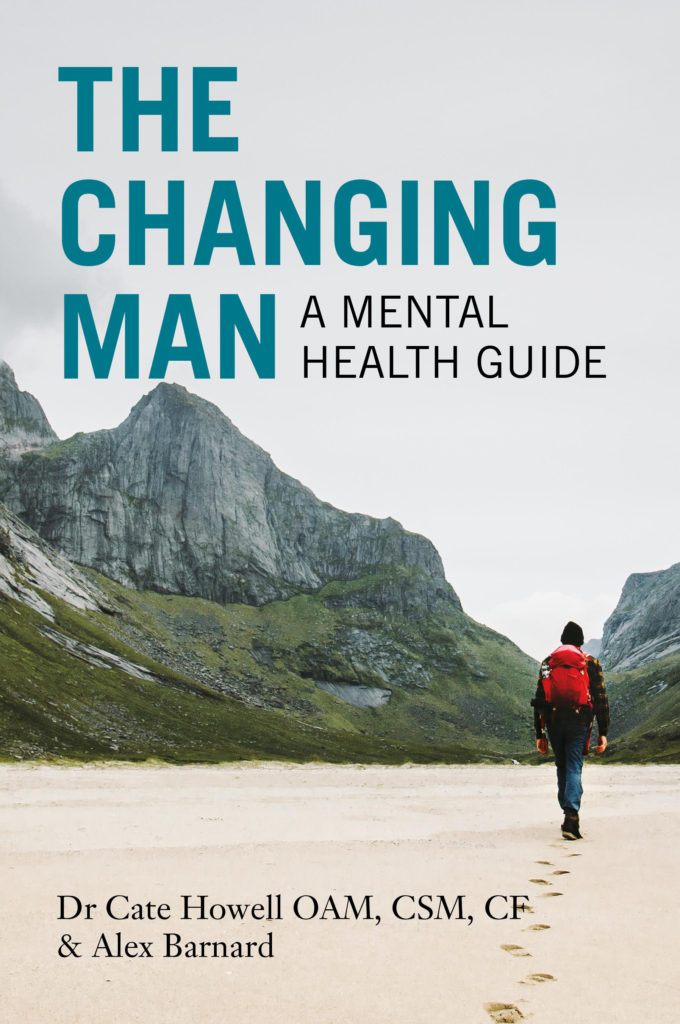This feature has been extracted from The Changing Man. Written by a prominent GP alongside her adult son, The Changing Man is a practical guide to the common mental health issues that affect millions of men, yet that few feel comfortable speaking about
by Dr Cate Howell and Alex Barnard

Men are changing. They are redefining what it is to be a man and reaching out for information about themselves and the life issues they are experiencing. In the past few years, more and more men have booked in to my practice seeking assistance and wanting to talk about life.
They have been looking for answers as to why they are struggling with their emotions or problems, and they have been open to learning about ways to improve how they are feeling and functioning, and seeking change.
What do we know about men and mental health?
Men and women have the same range of feelings but are taught by society to express and deal with them in different ways. Anyone can develop mental health issues, leading to mild or severe distress and possibly a negative effect on how they function in their day-to-day life.
Here are some facts and figures about men’s mental health:
- Men experience a range of mental health issues, such as depression, insomnia, anxiety, schizophrenia, substance-related issues, autism, dementia and post-traumatic stress disorder.
- Suicide rates in men are three times higher than for women and are a leading cause of death in young men globally.
- Substance use occurs at a rate of 3 to 1 in comparison to females.
- Young men suffer some of the most serious mental health issues, but many stay silent; only 13 per cent of young men seek help for mental health issues.
- There are higher rates of some mental health issues in homosexual men, such as mood disorders including depression and bipolar disorder, some forms of anxiety, and eating disorders. Bisexual men are also at greater risk. Social stigma is thought to have a significant impact on the mental health of individuals identifying as gay, transsexual or with another gender or sexual identity.
Men are less likely than women to seek help for mental health issues due to many social stigmas that surround men’s mental health, such as feeling shame or the expectation that they be in control and not appear to be ‘weak’. We need to change this.
There are a number of potential barriers that stop men from seeking help:
- The idea that being male means being ‘strong’ and having emotional issues or seeking help might mean being ‘weak’.
- The presence of mental health issues may mean ‘not being competent enough’ to solve the problem, ‘not in control’, or being vulnerable, and this might trigger a sense of shame.
- Men seem to have greater difficulty in recognising emotions than women, in part because of how they have been taught to push feelings down when growing up, and because they may experience emotions in different ways. Men are more likely to notice the physical symptoms of emotional distress before the emotional ones, so they may not realise they have mental health issues.
- When a man recogniaes that there is a problem, he may decide to get help, but when he reaches out, he may feel very uncomfortable talking about his mental health because of the stigma that exists in the community about mental health issues in general.
Toxic Masculinity
You may have heard the term ‘toxic masculinity’, which has entered popular usage recently, but do you know where it came from? It arose out of a men’s movement in the 1980s and was aimed at removing ‘limiting male stereotypes’ (males as ‘warriors’ or ‘kings’). In other words, the phrase was used to identify behaviours that were toxic to men, such as avoiding expressing emotions, shame, extreme self-reliance, extreme desires to dominate, putting down anything perceived as feminine in another male, or devaluing women.
The problem is that in recent times, this term has been misused to infer that all aspects of masculinity are bad and toxic to women. This misuse has made it seem like masculinity is pathological, and this has caused controversy and a sense of ‘attack’ on men. Masculinity does not equal ‘toxic masculinity’. What the term intends to convey is that living up to rigid stereotypes about what it is to be male has contributed to many mental health issues, as well as to problems in the community such as domestic violence.
Shame
Shame can result when men sense they don’t measure up to expectations, but it is often a hidden emotion. It is also the one most likely to motivate men to stay away from the help they need. Shame is behind the scenes with problems like performance anxiety, eating disorders and addictions. Being open to shame means being vulnerable. This does not mean weakness or lack of masculinity. It can be an act of courage and can deepen our connection to others.
Think about the statement ‘to man up’. It implies being tough and hard. But what if men incorporated what society sees as ‘soft’ qualities as well, such as being sensitive or kind? These characteristics may have negative connotations for men in our society, but ‘soft’ does not mean an absence of courage. It means being flexible, compassionate and courageous.
What Next?
As a society we have a long way to go to assist men to remain healthy and well, or to recover from mental health issues. There are many tools to help prevent mental health issues, from improving lifestyle, to connecting more with others, learning skills in problem-solving, dealing with relationship issues, or managing thoughts and feelings. Each day it is important to keep in mind what is important to you, and to be mindful as often as you can, as well as using your strengths and fostering your sense of purpose. This helps give you meaning in life.
In relation to ‘tomorrow’ or the future, hope, or the sense that things will turn out okay, has a vital role in your general health. Hope is not wishful thinking, but more about focusing on optimistic thinking, identifying your goals, and actively putting strategies in place to sustain the motivation to reach them. It is a state of mind and a learnt behaviour.
We live in a constantly changing world which at times is very stressful. Mental health issues are increasingly common, and they can affect our lives significantly or cause loss of life. There are still many barriers to overcome in relation to society’s messages about what it is to be male, and about seeking help when there is distress. Fortunately, we are starting to tackle these barriers and remove them. The Changing Man is part of these endeavours.
 About the authors:
About the authors:
Dr Cate Howell is a GP, therapist, educator and author. She had a Year 2000 Churchill Fellowship and completed a PhD on depression. In 2012 Cate was awarded the Order of Australia Medal for services to mental health. Cate currently works as a General Practitioner with Defence, and also has a private practice focusing on mental health and various teaching activities.
Alex Barnard is an educator and musician with a postgraduate degree in psychology. Alex has been passionate about mental health and wellbeing since he was a teenager, especially anxiety and depression prevention and intervention. He hopes to study Music Therapy to help people through music.

 About the authors:
About the authors: